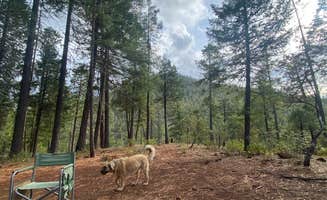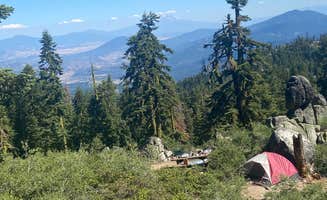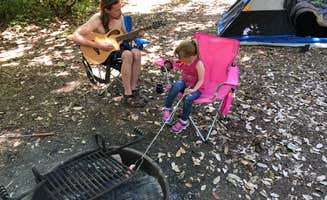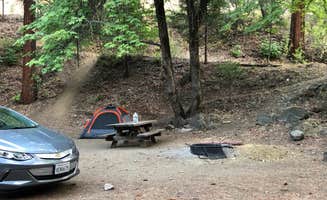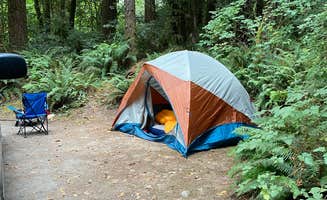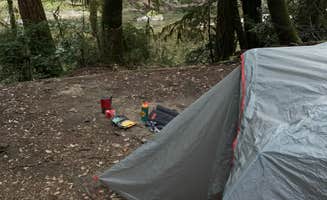Tent camping sites near Grants Pass, Oregon range in elevation from 1,200 feet at riverside locations to over 4,000 feet at mountain settings like Onion Mountain. Most campgrounds operate from May through October, with higher elevation sites having shorter seasons due to snow conditions. The Illinois River corridor offers numerous primitive camping options with varying levels of accessibility on Forest Service roads.
What to do
Stargazing at higher elevations: Onion Mountain Lookout sits at 4,000 feet elevation, providing exceptional night sky viewing. "You can see the milky way clearly," notes camper Kevin T.
Winter camping: Tin Can Campground in Merlin offers year-round access with opportunities for cold-weather camping. "We like to camp here especially in the snow," reports Shannon W., who appreciates the remote setting on a year-round creek.
Fishing opportunities: Small ponds and creeks throughout the region support trout fishing. Spalding Pond Campground stocks legal trout annually and contains native catfish and crawfish, making it suitable for anglers of various skill levels.
Cave exploration: Several campgrounds provide access to Oregon Caves National Monument. The Cave Creek Campground connects to the monument via a 2.5-mile hiking trail, creating a convenient base for cave tours.
What campers like
Water access: Many campers appreciate the rivers and lakes for cooling off. At Cedar Bloom, "There are 2 areas with river access, a shallow area and a deep swimming hole, with the option to float down some mild (and fun!) rapids," according to Nenah B.
Privacy between sites: Squaw Lakes offers walk-in tent sites that provide separation from other campers. "Pack-in/Pack-out, with the option to hire the camp host and his four-wheeler to drop your gear off at your site. You'll have to walk in," explains Jennifer A.
Communal facilities: Some campgrounds feature shared amenities beyond standard picnic tables. Cedar Bloom includes "a community kitchen, sauna and swimming hole," notes Corey O., adding practical value for tent campers.
Lower crowds: Smaller, less developed sites often remain uncrowded even in summer. At Squaw Lakes, Kayleigh W. mentions it's "not alot of people come here and I like it. very mellow. lots of wildlife."
What you should know
Free camping options: Josephine Campground offers no-cost tent camping with vault toilets but no drinking water. Bill T. describes it as having "about half a dozen tent sites and a pit toilet. You have to park your car in the lot and carry your gear a few yards to the different sites."
Road conditions: Many forest roads leading to tent sites require careful driving. Cave Creek Campground access presents challenges as "the road is paved, but Extremely Narrow with limited visibility," according to Kelli B.
Limited amenities: Most tent sites require self-sufficiency. Spalding Pond Campground has fire pits with metal grates and picnic tables but "no drinking water available, so you will need to bring your own or plan on filtering/boiling," advises Zak H.
Site closures: Seasonal and unexpected closures affect camping availability. Gates may restrict access to certain areas after fire season begins or during maintenance periods.
Tips for camping with families
Swimming spots: Several campgrounds feature kid-friendly water access. At Little Falls Campground, families can enjoy riverside recreation while maintaining safety. The campground feels secure, as "the park ranger checked on us in the morning," notes Liliána S.
Fishing for kids: Stocked ponds provide easier fishing experiences for children. Spalding Pond Campground's stocked trout pond makes for productive fishing outings with young anglers.
Hiking trails: Family-friendly paths exist throughout the region, with many leading to water features. At Squaw Lakes, Marcus V. enjoys "the lake and the trails around it," which provide manageable terrain for children.
Wildlife viewing: The quieter campgrounds offer better wildlife spotting opportunities. Bring binoculars and wildlife identification guides to enhance the experience for children.
Tips from RVers
Size restrictions: Most tent campgrounds in this region cannot accommodate larger RVs. At Cave Creek Campground, Kevin R. notes it's "lovely little tent only (i guess you could get a camper up here)," but Kelli B. cautions it's "extremely hard to take any type of RV there" due to narrow roads.
Double site options: Some campgrounds offer larger tent sites that can work for small campers. Little Falls Campground has "a double site, good for small 10ft less RV," according to Imerie T., who adds "We have a 5x8ft CcT so we fit amazingly in the double site."
Road access considerations: Forest Service roads often narrow considerably after leaving main highways. RVs over 20 feet generally struggle with access to the best tent camping near Grants Pass, Oregon, particularly at higher elevations or more remote locations.
Water crossing awareness: Some roads include low water crossings that may be impassable for low-clearance vehicles after heavy rain. Check current conditions before attempting access with any recreational vehicle.


